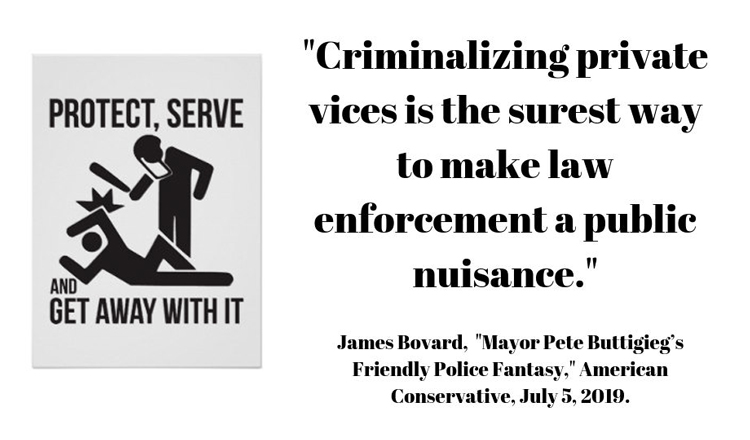 American Conservative
American Conservative
Mayor Pete Buttigieg’s Friendly Police Fantasy
Better relations will only come when we repeal the legions of laws empowering cops to unjustifiably accost peaceful citizens.
Police abuses are a major issue for Democratic candidates and may derail Buttigieg’s campaign after a recent South Bend police shooting. But sensitivity training or re-education classes will not solve the real problem: politicians have given police so much power that citizens naturally fear them.
In 2001, the Supreme Court ruled that police can justifiably arrest anyone believed to have “committed even a very minor criminal offense.” That case involved a Texas mother who was driving slowly near her home but, because her children were not wearing seatbelts, she was taken away by an abusive cop whose shouting left her children “terrified and hysterical.”
Justice Sandra Day O’Connor warned that “such unbounded discretion carries with it grave potential for abuse.” Unfortunately, there are endless pretexts for people to be arrested nowadays because federal, state, and local politicians and officials have criminalized daily life with hundreds of thousands of edicts. Capt. Steve Powell of the Colorado State Patrol commented, “Ninety percent of the cars out there are doing something that you can pull them over for. There are a jillion reasons people can be stopped—taillights, windshields cracked, any number of things.”
Forfeiture laws give police sweeping arbitrary power over Americans’ wallets, cars, and homes. Indiana Solicitor General Thomas Fisher told the Supreme Court in 2018 that the government is entitled to confiscate cars that exceed speed limits by five miles per hour—a standard that would justify seizing most vehicles. Between 2001 and 2014, lawmen seized more than $2.5 billion in cash from 60,000 travelers on the nation’s highways—with no criminal charges in the vast majority of cases, the Washington Post reported.
Police have been trained to confiscate private property of drivers by absurdly claiming that “trash on the floor of a vehicle, abundant energy drinks or air fresheners hanging from rearview mirrors” are signs of criminal activity. Blacks and Hispanics have been victimized far more often by such laws.
The Fourth Amendment prohibits unreasonable, warrantless searches of American citizens. But police have gutted that constitutional right with dogs that will give them a positive alert almost any time they seek a pretext to forcibly search someone’s vehicle. The fact that canines are sometimes trained to give false alerts is irrelevant as long as the government always wins. Canine alerts to currency are routinely used to justify seizures even though most U.S. currency has trace amounts of drug contamination.
There is a long history of officialdom fabricating pretexts to stop drivers. From 1992 through 2013, the Drug Enforcement Administration illegally commandeered the phone records of all Americans who called most of the foreign nations in the world, as USA Today revealed in 2015. To keep its phone record seizures secret, the DEA partnered with local police to concoct phony reasons for traffic stops that sometimes included staging fake auto accidents and even car thefts. Why should citizens trust law enforcement agencies that engaged of decades of systemic fraud?
Uncle Sam has brought the Surveillance State to the nearest police car dashboard. Federal grants have enabled many states and localities to equip police cars with license plate scanners that provide plenty of bogus pretexts to harass hapless drivers. License plate readers often misread plates.
Brian Hofer was pulled off Interstate 80 in California and handcuffed and held at gunpoint after his rental vehicle was misreported as stolen. Hofer commented in 2019: “I’m sitting ice-cold and saying nothing because I do not want any itchy trigger fingers.” A Florida man was pulled over by a Maryland transportation policeman who angrily demanded to know where his gun was. A license plate scan revealed that the driver had a concealed carry permit in Florida—where he had left his firearm. Police spent hours taunting him and searching his minivan before permitting him to move on, leaving his wife and daughters utterly distraught.
The war on drugs and its endless crackdowns and intrusions spurred far more distrust of police but politicians learned nothing from its debacles. Sixteen states have raised the smoking age to 21, and there is a push (supported by Senate Majority Leader Mitch McConnell) to dictate a federal smoking age of 21. Why not simply issue a federal mandate for an annual additional 10 million unnecessary confrontations between police and youth? Criminalizing private vices is the surest way to make law enforcement a public nuisance.
Citizens are wary of police cars in their rear view mirrors because politicians and judges made average Americans legally inferior to anyone with a badge and a gun. Police almost always receive legal immunity when they unjustifiably shoot people—it is practically a perk of their job. The pervasive coverups and lies that follow dubious killings by police does more to spur wariness than a million “Officer Friendly” public service announcements can counteract.
The best way to encourage citizens to have “a feeling not of fear but of safety” is to repeal legions of laws empowering police to unjustifiably accost and wrongfully subjugate peaceful citizens. But that is unlikely to happen as long as most politicians are more interested in power than in domestic tranquility.
James Bovard is the author of Lost Rights, Attention Deficit Democracy, and Public Policy Hooligan. He is also a USA Today columnist. Follow him on Twitter @JimBovard.

Comments are closed.